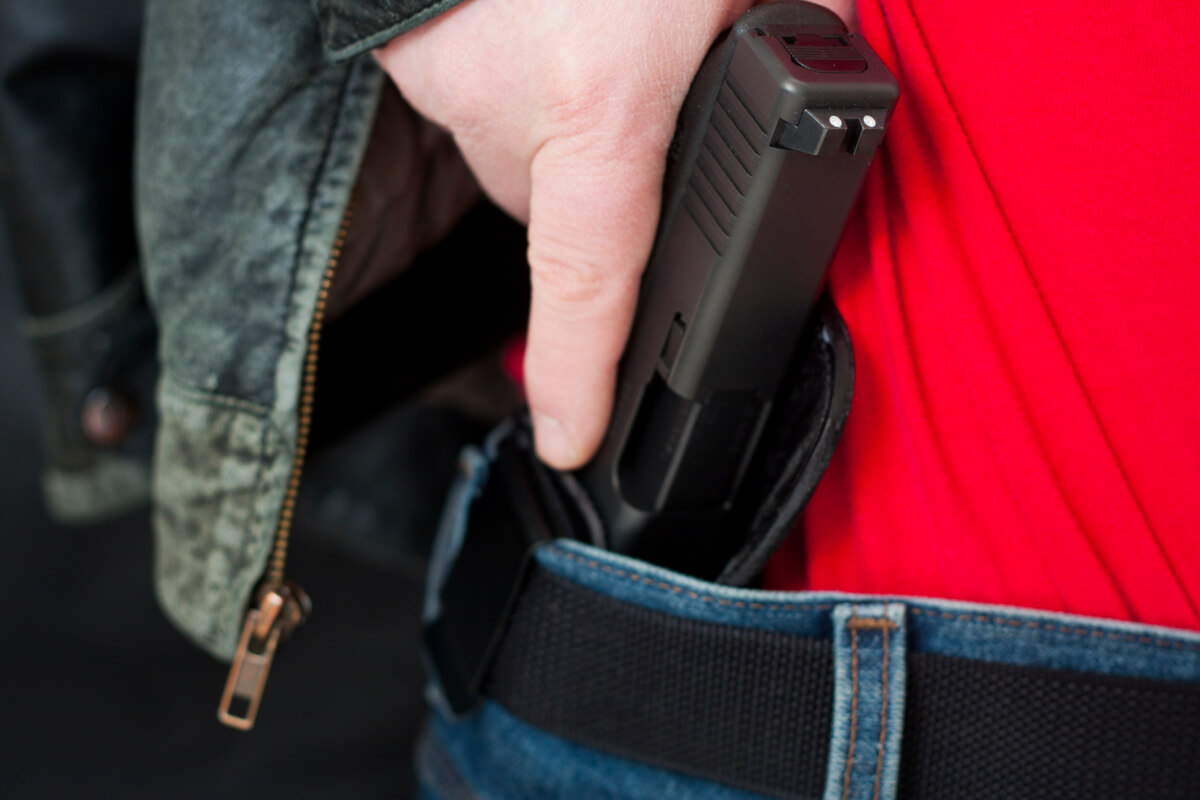If you live in a state where open carry is legal and doesn’t require a license or permit, or may encounter folks who don’t abide by firearms carry laws, it’s worthwhile to know how to spot a concealed firearm. In this article, we offer some tips on how to spot a concealed weapon on a person, and try to avoid a SHTF scenario with an active shooter.
What to look out for
Anyone who conceals a weapon will not be able to “hide” the fact 100%. Below, we enumerate a few telltale signs that could give away a person’s concealed carry weapon or CCW.
Bulges
Those who aren’t very experienced in concealing their handguns will exhibit an obvious gun-shaped bulge. Handguns are bulky and their irregular shape is simply very difficult to hide without the right CCW holster and another layer of clothing to assist in concealment.


Asymmetrical walk
A person with a CCW will sometimes exhibit an unusual gait and stride, almost like limping. This is due to the imbalance caused by the weapon’s weight and form; if they place it in a jacket, the jacket will sag and make them look unbalanced, and the way they walk will also appear unbalanced. This is especially evident when another person approaches them. The concealed carrier will shift their hip, in an attempt to keep the CCW from the other person’s view. Some may even change the direction they’re walking altogether to avoid exposing themselves. As for those who use an ankle holster, they’ll likewise walk awkwardly, since they’re carrying added weight on only one ankle.
Fidgeting
Someone who’s carrying can’t help but check or “adjust” the position of their concealed handgun. You may notice them trying to be subtle in “checking” that their gun is in its “secret pocket” in their jacket or pants by brushing the inside of their arms, “palming” the location of their gun, or just plain frisking themselves and opening their jacket when they believe no one’s looking.
Unusual clothing
Most people who have a CCW will sometimes make the mistake of wearing clothing that is glaringly inappropriate for the weather or season, or even their occupation. Choices like these can literally scream “I’m carrying”:
– Trench coat, jacket or hoodie in warm weather
– Bundled up in several pieces of clothing, despite warm weather
– Wearing a suit and tie in an occupation that doesn’t require it
– Wearing jacket and pants combo with way too many pockets
– An oversized jacket, coat, or vest that’s incompatible with other clothing
– Coat in cold weather, but left open for quick access to the weapon
– An actual jacket, coat, shirt or pair of pants that’s specifically designed for CCW

Unusual accessories
Sometimes, the person with a CCW will also try to conceal their identity. A baseball cap coupled with dark sunglasses and even a hoodie are sometimes used in combination to hide their face, in order to keep a low profile. Another telltale accessory is the belt – someone with a CCW will wear a distinct belt that supports a holstered gun.
There may also be instances where the CCW may not be in their pocket or waistband, but kept in a large fanny pack, satchel or messenger bag specifically designed for that purpose. You can make a quick search online, and you’ll see that there are already several outfitter brands that sell these types of accessories on the open market.



What to do if someone’s carrying
If you suspect a person has a CCW, don’t immediately write them off as a threat, but don’t dismiss them as harmless either. If they look suspicious, don’t dare confront them; never challenge or question them directly. They may be law enforcement working undercover and you may be getting in their way. If they’re a criminal, they might shoot you or take you hostage. It’s enough to be wary of their presence and leave the area. If their presence and behavior still bother you, call 911 and describe what you saw to the authorities. Alert local law enforcement, and let the professionals do the questioning.

Final notes
The tips here feature the more common signs of CCW. To actually spot a concealed weapon can be difficult, since anyone serious about concealing a weapon will study the techniques and products available to him. To spot a CCW, sometimes it’s a mix of luck and situational awareness.
Take note of any suspicious-looking characters and your immediate location. Is there a nearby establishment that could be of interest to criminals? Is your suspect acting a little “off”? Remain mindful and keep a watchful eye over other people when in public. Criminals or those who intend to inflict harm on others are hardly ever identifiable, but they can exhibit small telltale signs if you know how to look. That’s why it’s important to remain informed about the CCW products and methods available, as these can be the same products and methods they’ll use.
Do a bit of research online, visit a gun store with a broad selection of accessories and ask about the latest CCW products and methods, and consult a LEO or lawyer about the rules regarding them. Armed with this knowledge, you can recognize potential threats and have a better chance of keeping yourself and those you care about out of harm’s way.


